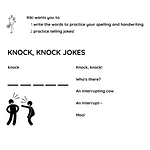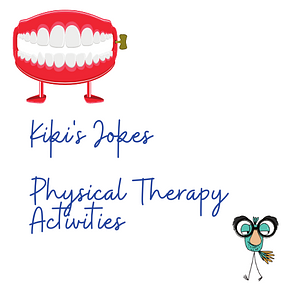Figurative Language: Jokes
ID
13ef5f
Description
A collection of terms, definitions, and examples of jokes to teach figurative language related to Jokes,
License
Ambiki License - © Ambitious Idea Labs (AL)
Usable with 2 PDF resources

Handwriting With Joke Concepts
April Fools Day. Use these handwriting worksheets to practice letter for...
Create a free Ambiki account to view the 32 activity list items for this activity list.
Activity lists are used by SLPs, OTs, and PTs to enhance their sessions - both in-person and teletherapy. An activity list can be used in a slide-show manner in a session, in a game, and as a printable artifact to use in an in-person session.
Create a free Ambiki account to view the phonemes table for this activity list.
Create a free Ambiki account to view the blends table for this activity list.
Additional information
- Mixed list
- English
What are activity lists?
An activity list consists of activity list items which can be phonemes, blends, words, minimal pairs, phrases, sentences, and/or paragraphs.
A list can contain all of the same type of items (i.e. word list) or it could be a mix of different types of items (i.e. some words and some minimal pairs).
Activity lists are not only for speech therapists. Ambiki has many activity lists for OTs and PTs as well.
As an example, an OT might use a "Zones of Regulation" activity list to work on Emotional Regulation with a patient.
A PT might use a "Coordination Activities" list with a patient to practice Strength or Bilateral Coordination exercises.
An alternate way to think of an activity list is that it is like a manual for how to use a PDF resource. Ambiki activity lists are connected to Ambiki PDF resources. The activity list is a way to look at a resource from another perspective - to cover the resource completely from preparation to the end of the session. Each activity list item provides a way that you can elicit a response from your client.
Themes
Evidence based practice citations
-
Idioms and Speech and Language Therapy
Author(s): David Clarke

